Learning opposite words—also called antonyms—is essential for building strong English vocabulary and better communication skills. This educational guide covers 1,000 opposite word pairs commonly used in daily conversations, academic writing, and language exams. It helps learners understand word relationships, contrast meanings, and improve sentence clarity. Designed for students, teachers, and English language beginners, this list supports vocabulary retention and reading comprehension. It aligns with topics like synonyms and antonyms, grammar rules, and word usage, making it perfect for learning English the smart, structured way.
Opposite Words A to Z
A – Opposite Words
Opposite words with A help show how one word can mean the reverse of another. For example, “accept” means to say yes, while “reject” means to say no. These word pairs make your English stronger and more clear in daily use.
- Antonym – Synonym
- Arrive – Depart
- Awake – Asleep
- Annoy – Satisfy
- Answer – Question
- Artificial – Natural
- Apart – Together
- Argue – Agree
- Animal – Human
- Alive – Dead
- Amuse – Bore
- Always – Never
- Autumn – Spring
- Allow – Forbid
- Ascent – Descent
- Already – Not yet
- Attack – Defend
- Awful – Nice
- Attic – Cellar
- Ask – Answer
- Ancestor – Descendant
- Angel – Devil
- Ancient – Modern
- Attack – Defend
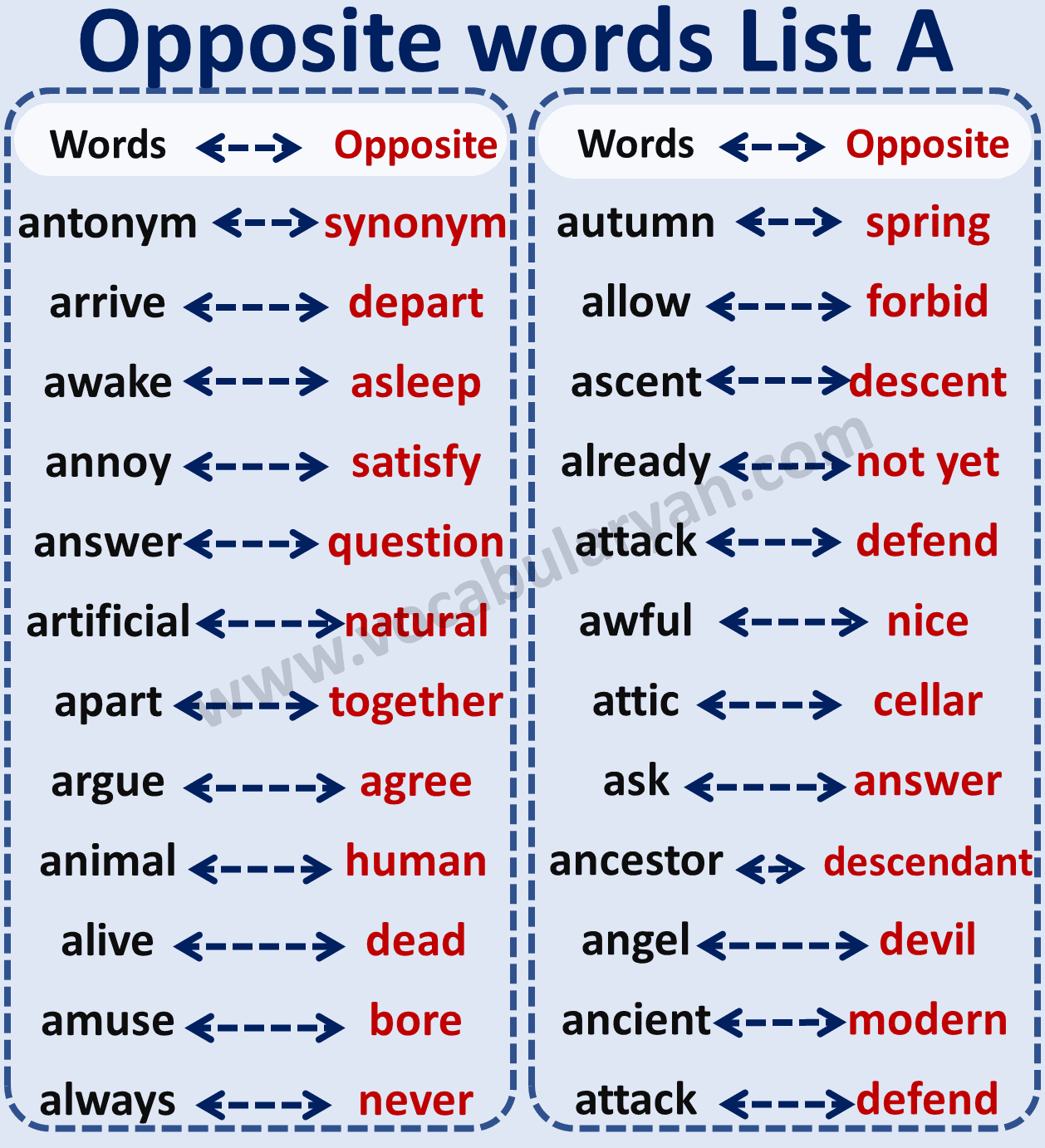
B – Opposite Words
Words starting with B often describe actions or feelings. For example, “big” means large, while “small” means tiny. Learning opposites like these helps express size, amount, and mood.
- Better – Worse
- Bravery – Cowardice
- Bitter – Sweet
- Build – Demolish
- Borrow – Lend
- Break – Fix
- Bless – Curse
- Broad – Narrow
- Bright – Dull
- Bent – Straight
- Big – Small
- Best – Worst
- Brave – Cowardly
- Bold – Timid, Meek
- Blunt – Sharp
- Backward – Forward
- Bad – Good
- Blame – Praise
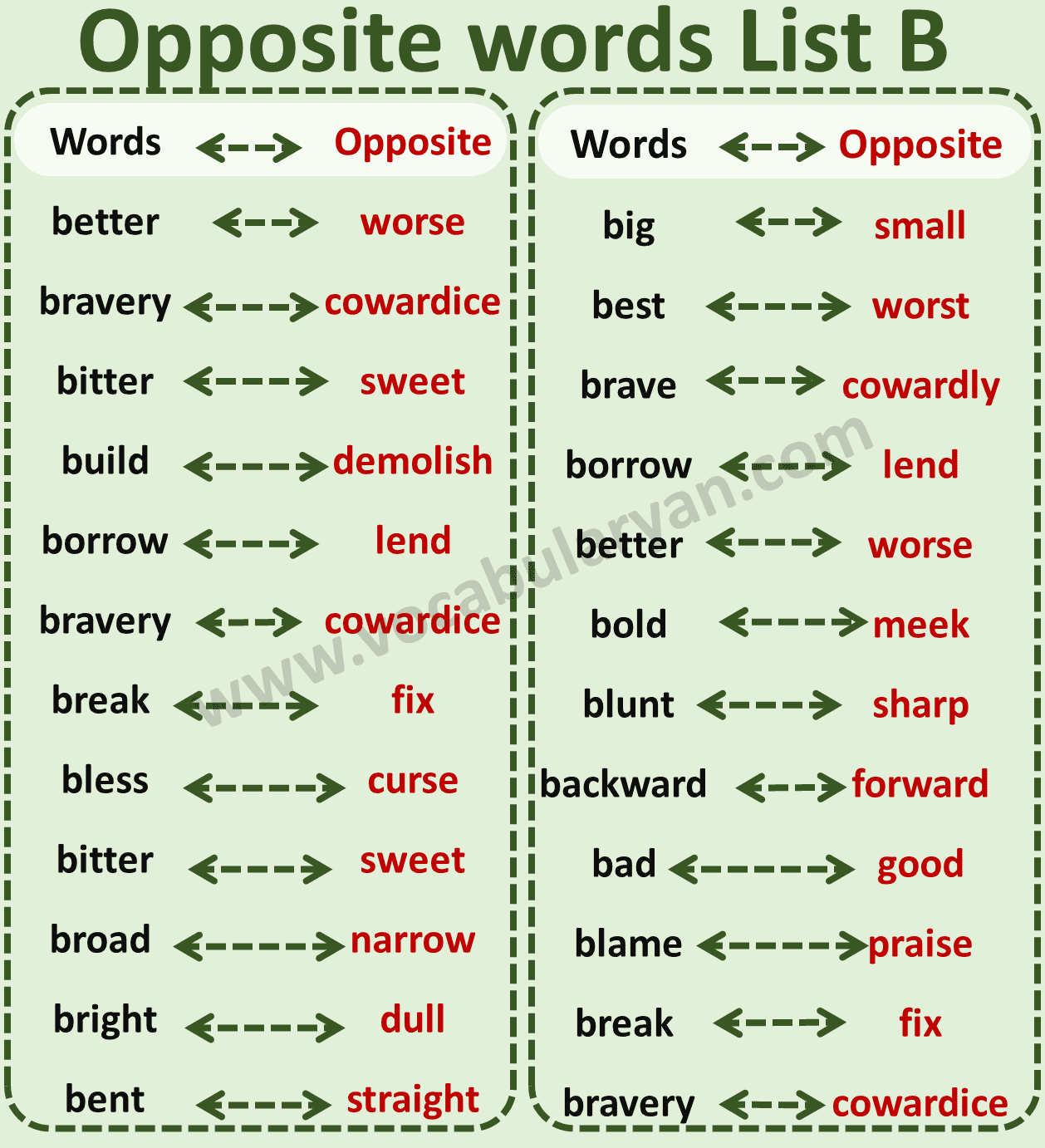
C – Opposite Words
C words and their opposites show changes in condition or quality. For example, “clean” means not dirty, while “dirty” means not clean. These help in daily talk and writing clearly.
- Correct – Incorrect
- Conceal – Reveal
- Clear – Vague, Cloudy
- Closed – Open
- Catch – Miss
- Clockwise – Anti-clockwise
- Common – Rare
- Capable – Incapable
- Courteous – Discourteous, Rude
- Cellar – Attic
- Certainly – Probably
- Careful – Careless
- Come – Go
- Courage – Cowardice
- Cruel – Kind
- Captivity – Liberty
- Calm – Troubled
- Clever – Stupid
- Careful – Rush, Careless
- Close – Open
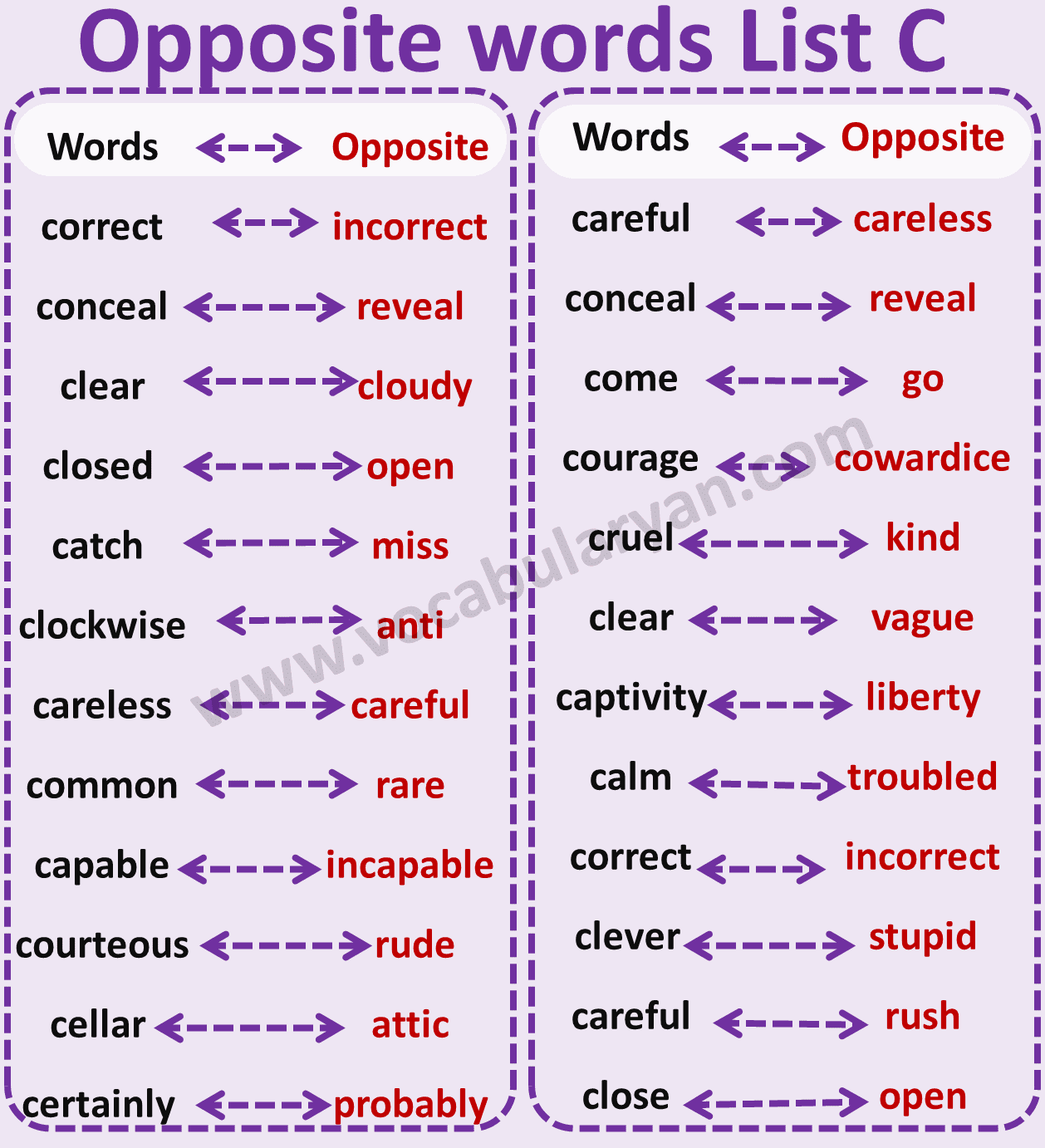
D – Opposite Words
Opposite Words With D, you’ll find opposites that describe direction or actions. For example, “day” is the light time, and “night” is the dark time. Such pairs help describe time and setting.
- Doubt – Trust
- Daytime – Midnight
- Dusk – Dawn
- Demand – Supply
- Despair – Hope
- Dark – Light
- Deep – Shallow
- Drunk – Sober
- Dawn – Sunset
- Dry – Wet
- Defend – Attack
- Demolish – Build
- Dormant – Awake
- Defeat – Victory
- Decrease – Increase
- Denounce – Praise
- Dally – Hurry
- Divide – Join
- Dim – Bright
- Docile – Disobedient
- Delicate – Strong
- Discourage – Encourage
- Defy – Obey
- Damage – Improve
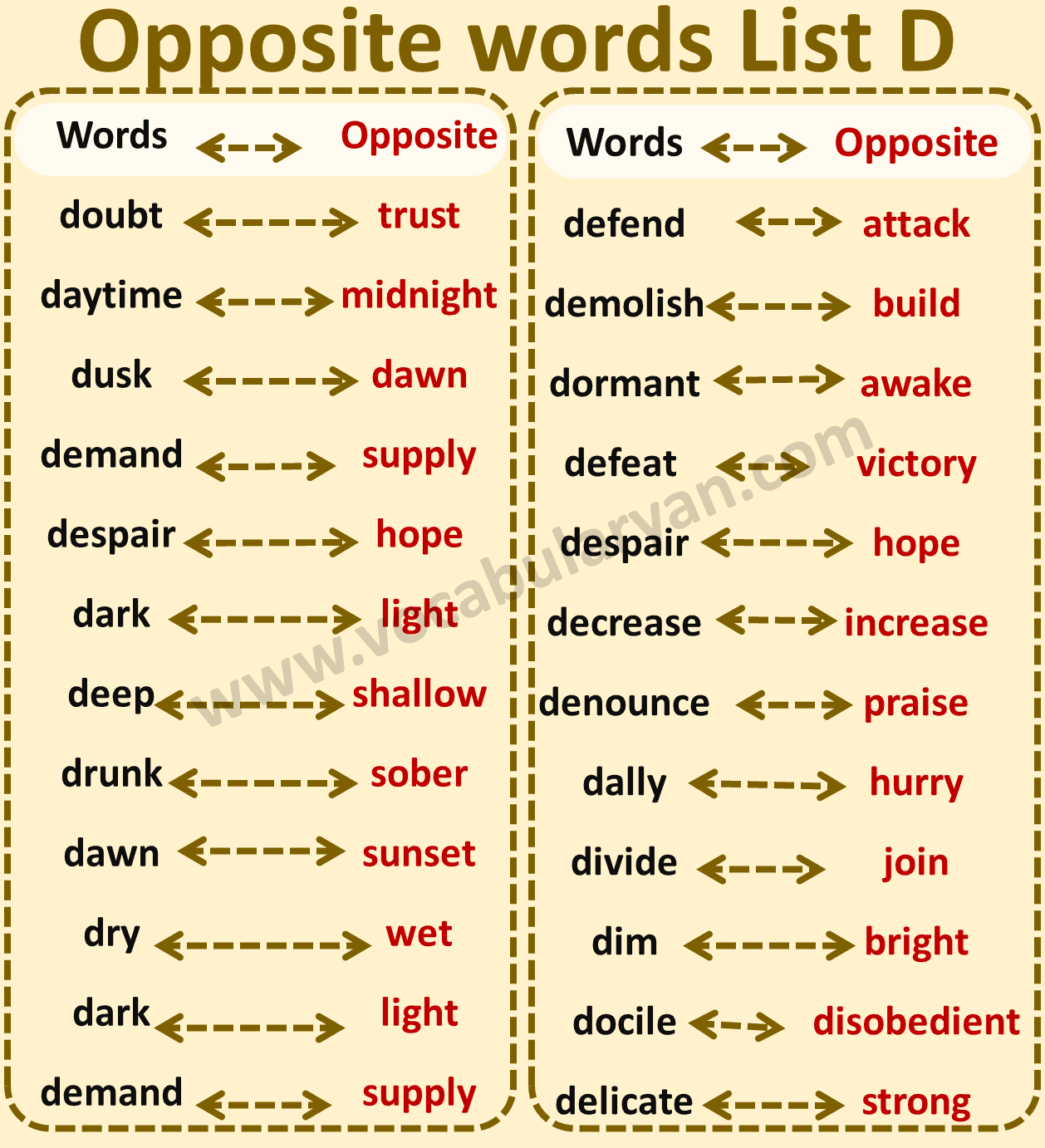
E – Opposite Words
E-word opposites help explain ideas and feelings. For example, “easy” means not hard, and “hard” means not easy. These make your thoughts more exact in speech and writing.
- Enormous – Tiny
- Enlarge – Reduce
- Enemy – Friend
- Employer – Employee
- Entrance – Exit
- Enough – Insufficient
- Excite – Bore
- Exceptional – Usual
- Empty – Full
- End – Begin
- Ebb – Flow
- Enjoy – Hate
- Enter – Leave
- Exclude – Include
- Early – Late
- Everlasting – Transient
- Exactly – Inaccurately
- Evil – Virtuous
- Expensive – Cheap
- Excited – Calm
- Exterior – Interior
- External – Internal
- East – West
- Entirely – Partially
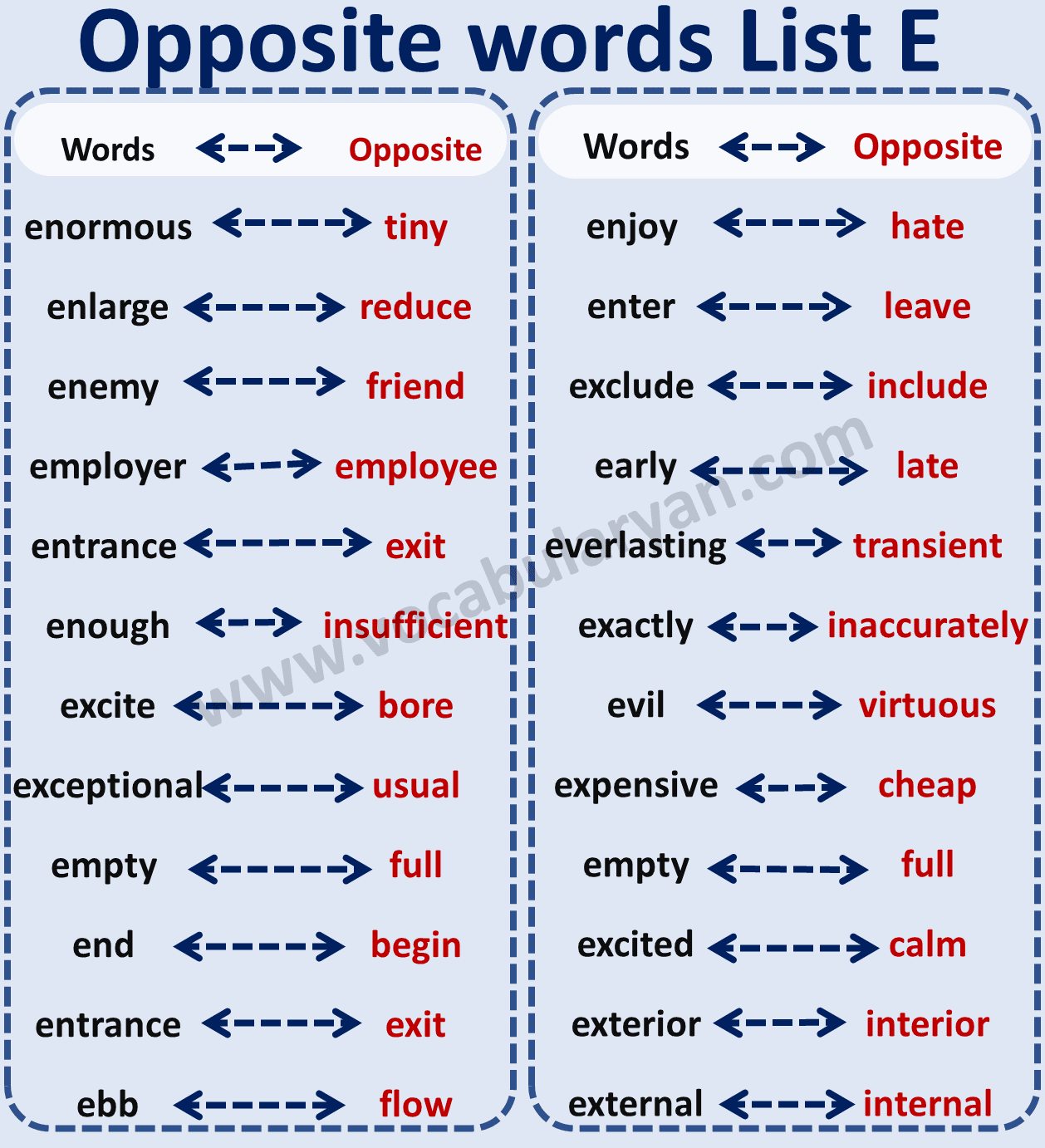
F – Opposite Words
F opposites are useful in showing emotion or truth. For example, “false” means not true, while “true” means correct or right. Knowing these helps you explain facts better.
- Fat – Skinny
- Frown – Smile
- Friend – Enemy
- Fortunate – Unfortunate
- Fix – Break
- Flat – Hilly
- Find – Lose
- Fake – Real
- First – Last
- Free – Restricted
- Foolish – Wise
- Famous – Unknown
- Freeze – Boil
- Forward – Backward
- Float – Sink
- Fat – Thin
- Few – Many
- Forget – Remember
- Follow – Lead
- Firm – Flabby
- Fast – Slow
- Fall – Rise
- Floor – Ceiling
- Fresh – Stale
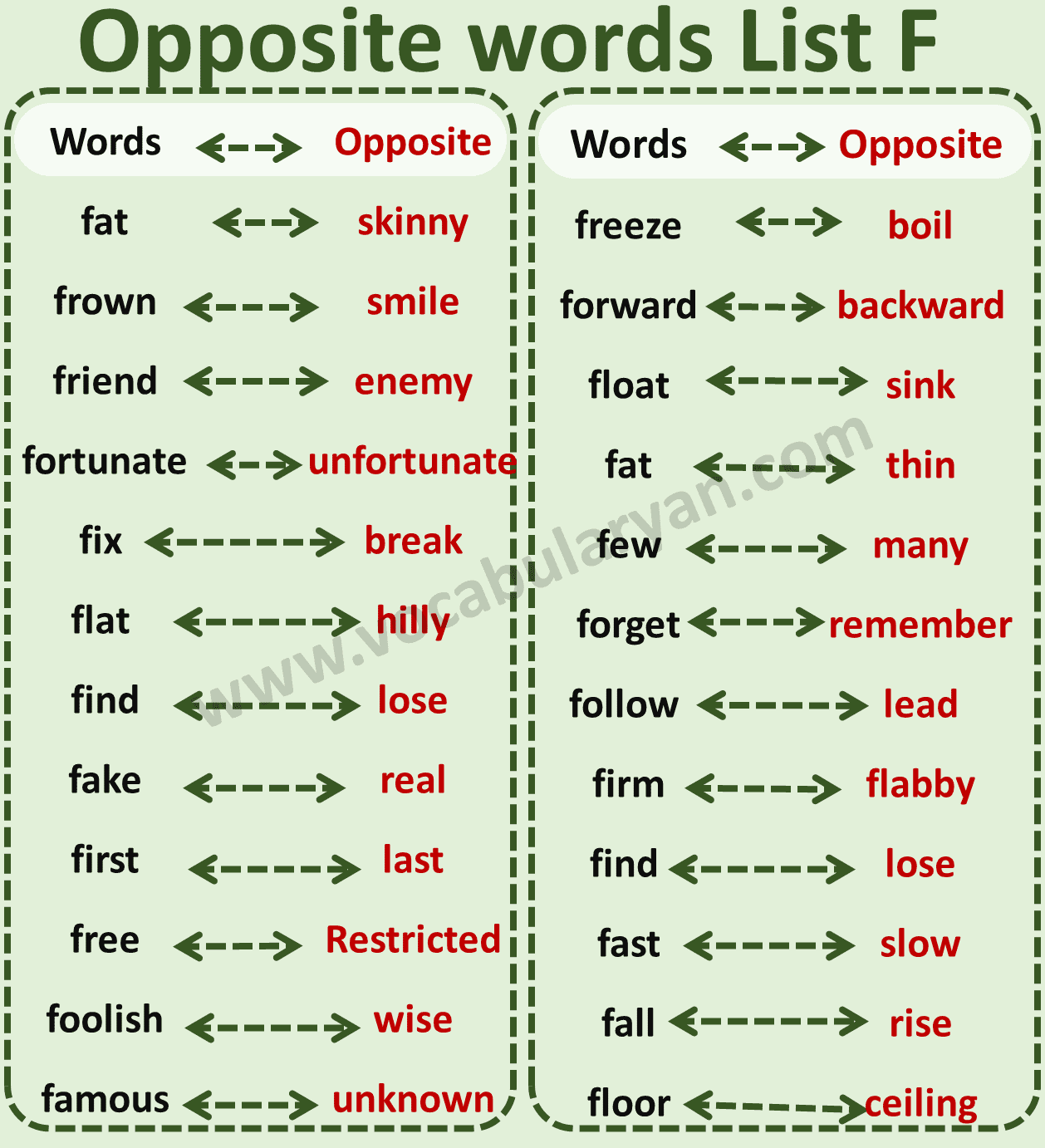
G – Opposite Words
G words often show qualities or behavior. For example, “give” means to offer, while “take” means to receive. These words help talk about actions and sharing.
- Grant – Revoke
- Good – Bad
- Get – Lose
- Garbage Can – Treasure
- Guilty – Innocent
- Go – Come
- Grief – Joy
- Gentle – Violent
- Generous – Mean
- Gentleman – Lady
- Giant – Tiny
- Guest – Host
- Gallant – Cowardly
- Gratis – For a fee
- Grow – Shrink
- Give – Take
- Good Luck – Bad Luck
- Girl – Boy
- Grown-Up – Child
- Grasping – Generous
- General – Particular
- Heat – Cold
- Hate – Enjoy
- Human – Animal
- Humid – Dry
- Hard – Soft
- Happy – Sad
- Huge – Tiny
- Husband – Wife
- Host – Guest
- Horizontal – Vertical
- He – She
- Hopeless – Hopeful
- High – Low
- Here – There
- Harsh – Mild
- Hot – Cold
- Harmful – Harmless
- Health – Disease
- Hungry – Full
- Hopeful – Desperate
- Heaven – Hell
- Harvest – Plant
- Hit – Miss
- Happiness – Sadness
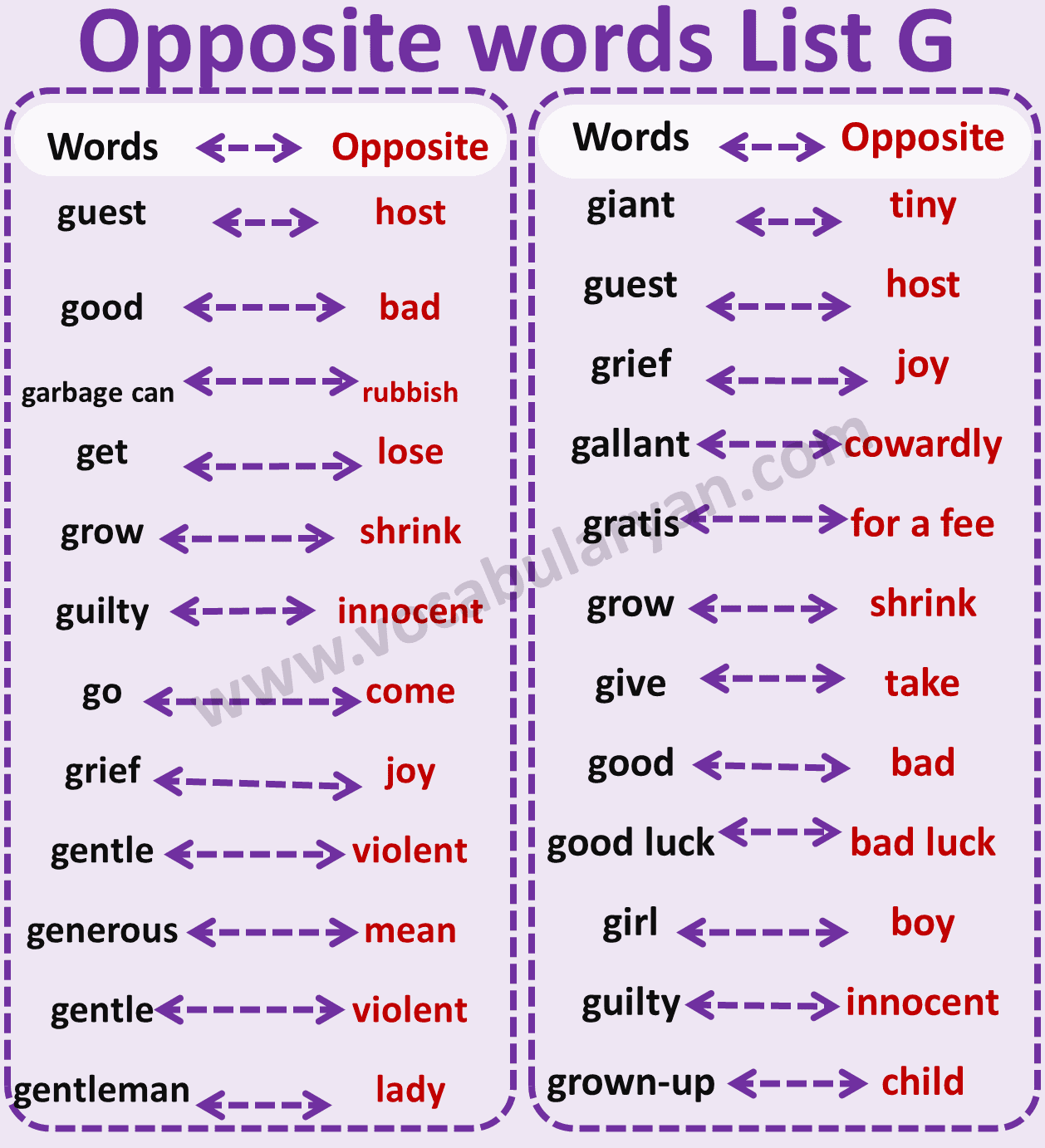
H – Opposite Words
H opposites can describe how people feel or act. For example, “happy” means feeling good, and “sad” means feeling bad. These help in talking about emotions.
- Happy – Sad
- Hard – Soft
- Healthy – Sick
- Heavy – Light
- Help – Harm
- Hope – Despair
- Humble – Proud
- Hot – Cold
- Hate – Love
- Hide – Show
- High – Low
- Harm – Heal
- Here – There
- Hasten – Delay
- Host – Guest
- Huge – Tiny
- Honor – Shame
- Hang – Drop
- Hunger – Fullness
- Human – Animal
- Hero – Villain
- Harsh – Gentle
- Hurry – Wait
- Hook – Detach
- Hold – Release
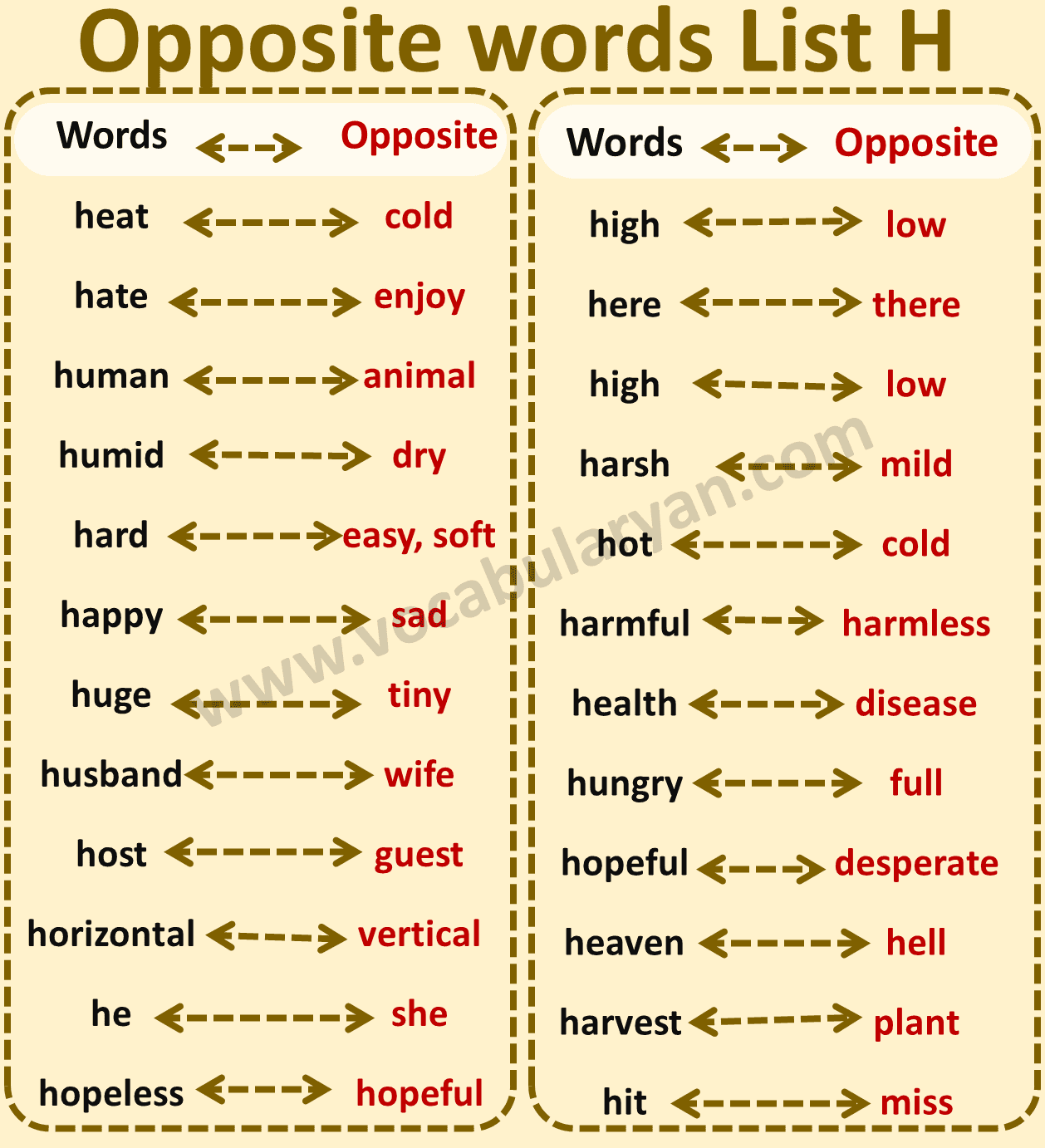
I – Opposite Words
I words often describe state or form. For example, “increase” means to grow, while “decrease” means to reduce. These help in math, science, and everyday talk.
- Interrupt – Continue
- Inside – Outside
- Intentional – Accidental
- Illicit – Legal
- Inertia – Activeness
- Ignorant – Educated
- Innocent – Guilty
- Important – Trivial
- Instructor – Pupil
- Intelligent – Stupid
- Implacable – Peaceable
- Inter – Exhume
- In – Out
- Increase – Decrease
- Insult – Compliment
- Immigration – Emigration
- Import – Export
- Identical – Different
- In Front Of – Behind
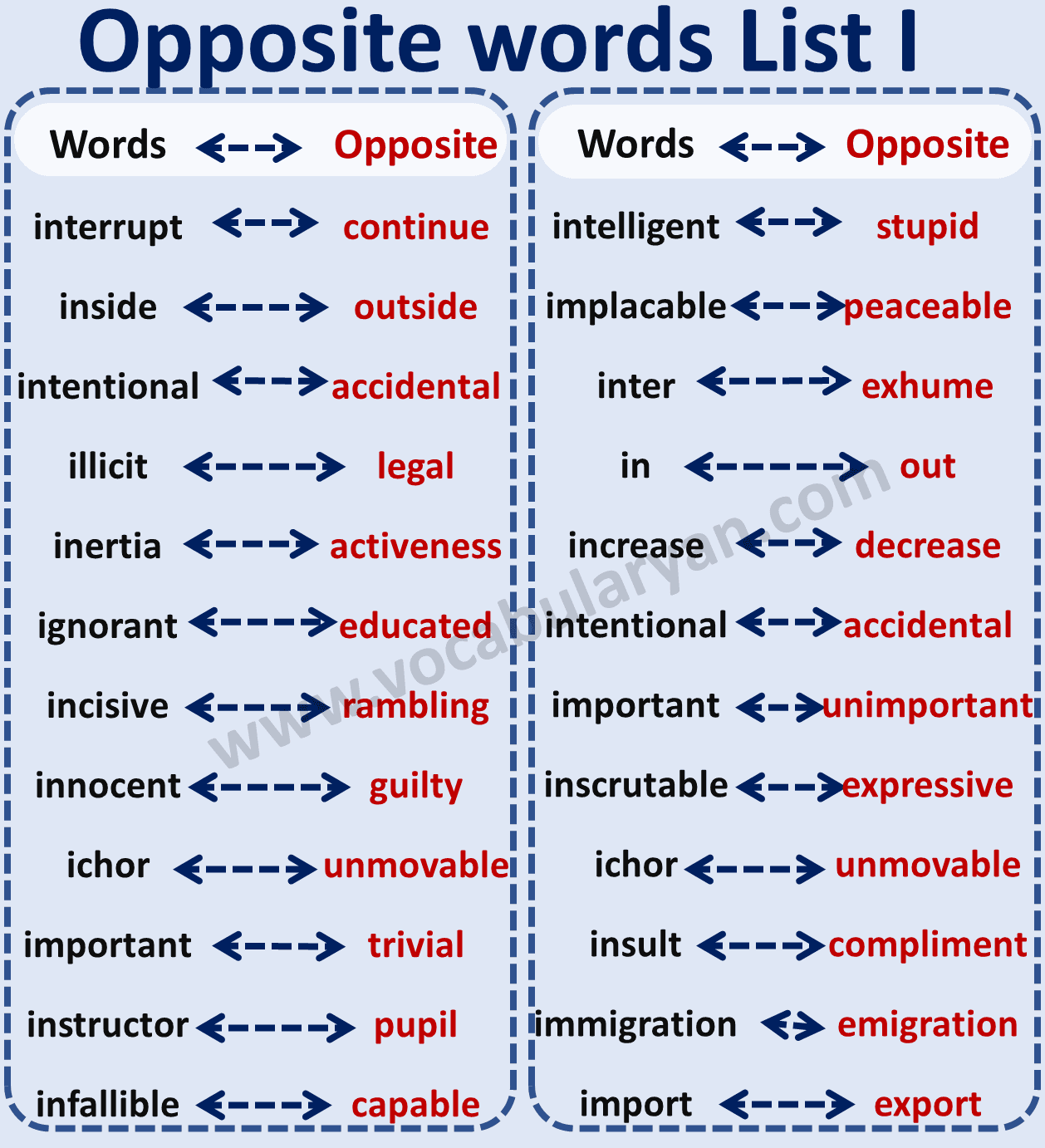
J – Opposite Words
J opposites are fewer but still useful. For example, “join” means to come together, while “separate” means to split. These help describe actions in groups or teams.
- Join – Separate
- Joy – Sorrow
- Just – Unfair
- Joke – Seriousness
- Jump – Fall
- Justice – Injustice
- Jealous – Content
- Jolly – Gloomy
- Jumble – Organize
- Juvenile – Adult
- Jam – Flow
- Jumpy – Calm
- Jagged – Smooth
- Jazzy – Dull
- Jeer – Praise
- Jerk – Glide
- Joiner – Loner
- Jinx – Blessing
- Joyful – Miserable
- Judicious – Foolish
- Juicy – Dry
- Jammed – Clear
- Jaded – Excited
- Jeopardize – Protect
- Justifiable – Unreasonable
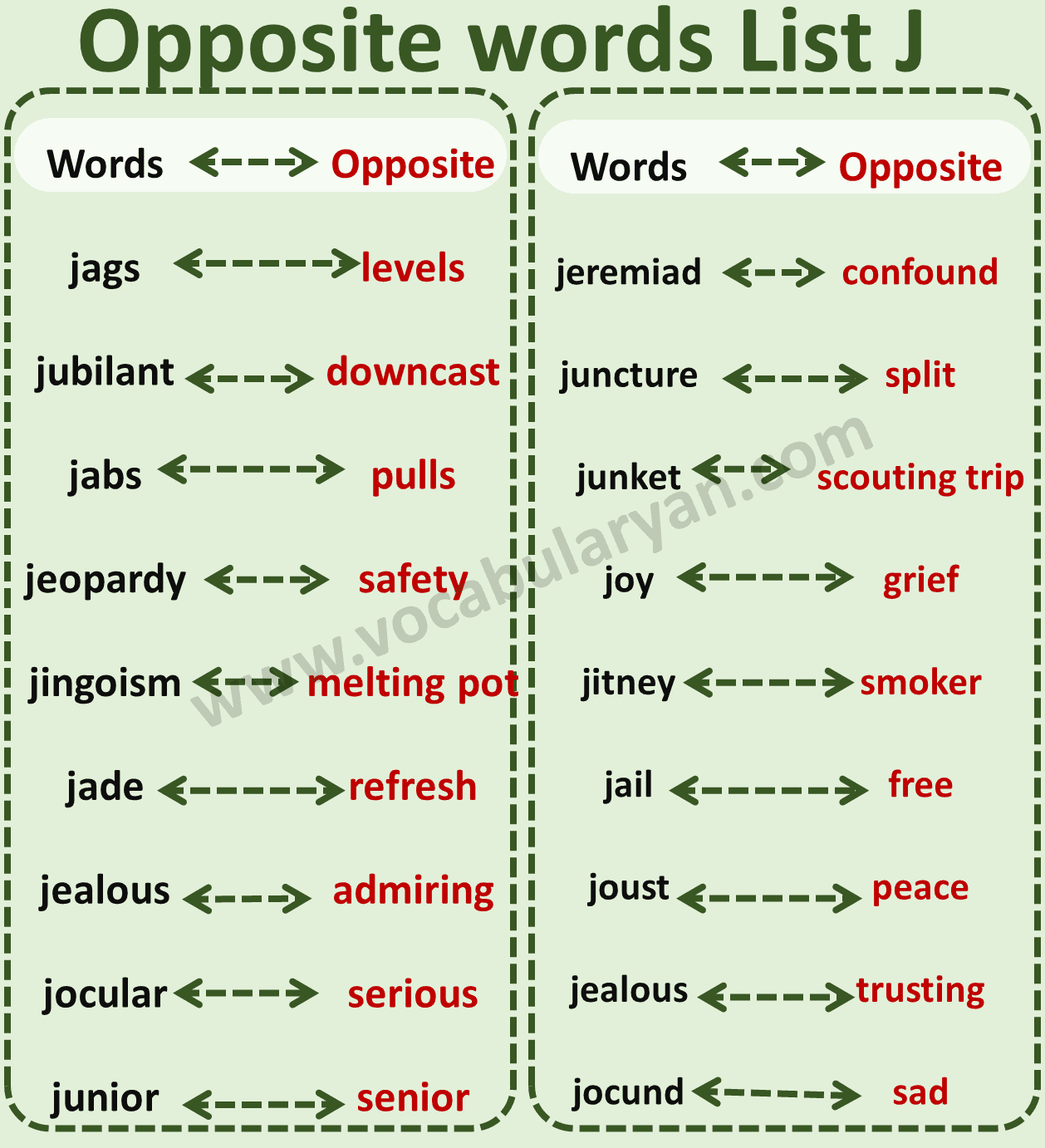
K – Opposite Words
K common opposite pairs, you may see them in phrases. For example, “known” means something is familiar, and “unknown” means it’s not. These help in learning and facts.
- Kowtow – Disrespect
- Knotty – Smooth
- Knit – Unravel
- Kind – Cruel
- Kin – Unrelated
- Kit – Disburse
- Know – Forget
- Kindergarten – College
- Kick – Receive
- Kennel – Citadel
- Kidnap – Release
- Kudos – Shame
- Kneel – Rise
- Knowledge – Ignorance
- Keep – Give
- Kickoff – Destination
- Knead – Destroy
- Knock – Praise
- Kill – Save
- King – Queen
- Kernel – Exterior
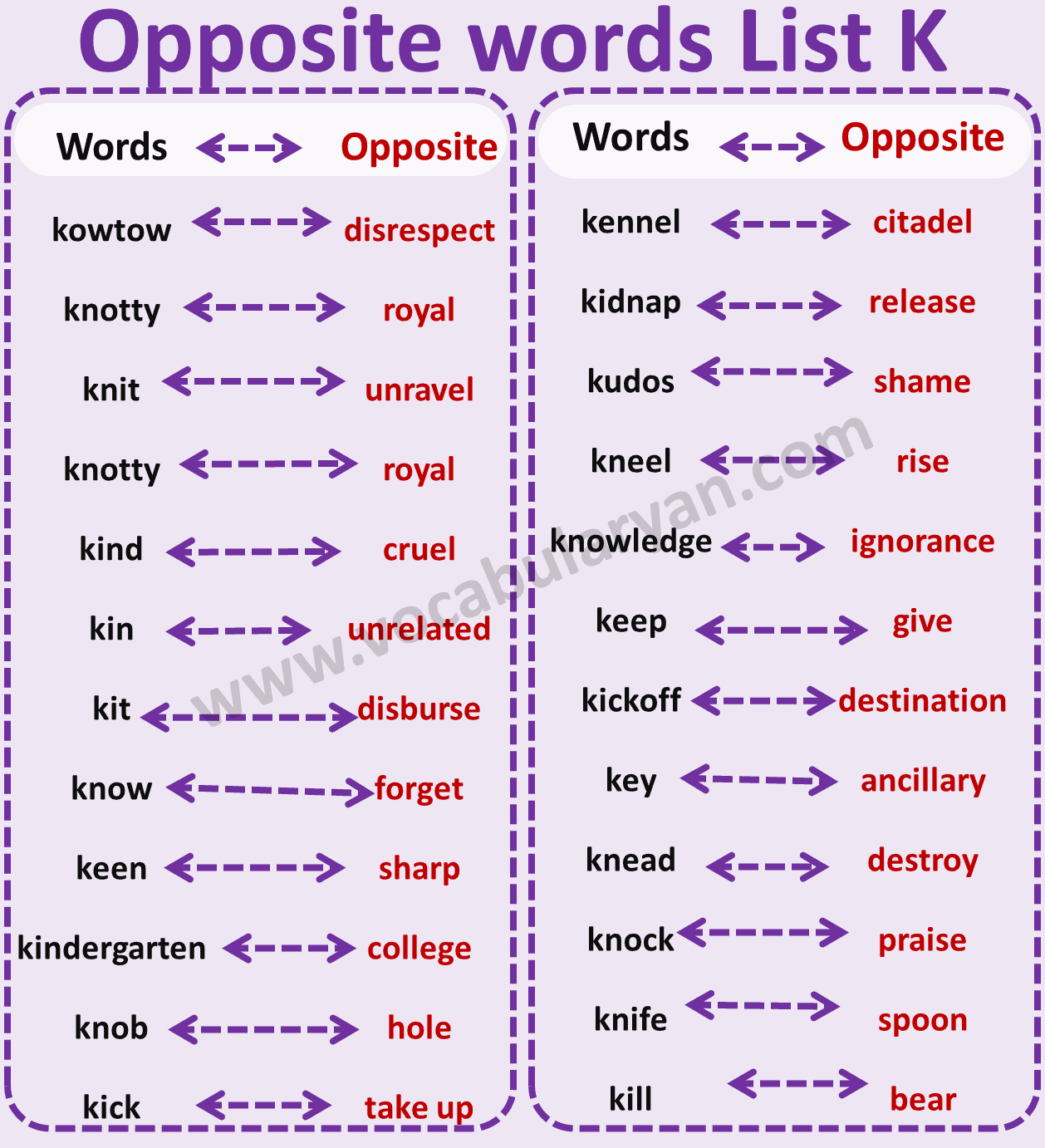
L – Opposite Words
L words show qualities and size. For example, “long” means extended, while “short” means not long. These help when giving clear details.
- Laugh – Cry
- Lazy – Active
- Lead – Follow
- Light – Dark
- Love – Hate
- Loud – Quiet
- Lose – Win
- Low – High
- Late – Early
- Little – Big
- Long – Short
- Live – Die
- Loose – Tight
- Leave – Stay
- Lend – Borrow
- Likely – Unlikely
- Legal – Illegal
- Lean – Fat
- Luxury – Necessity
- Liquid – Solid
- Limited – Unlimited
- Less – More
- Local – Global
- Locked – Open
- Logical – Irrational
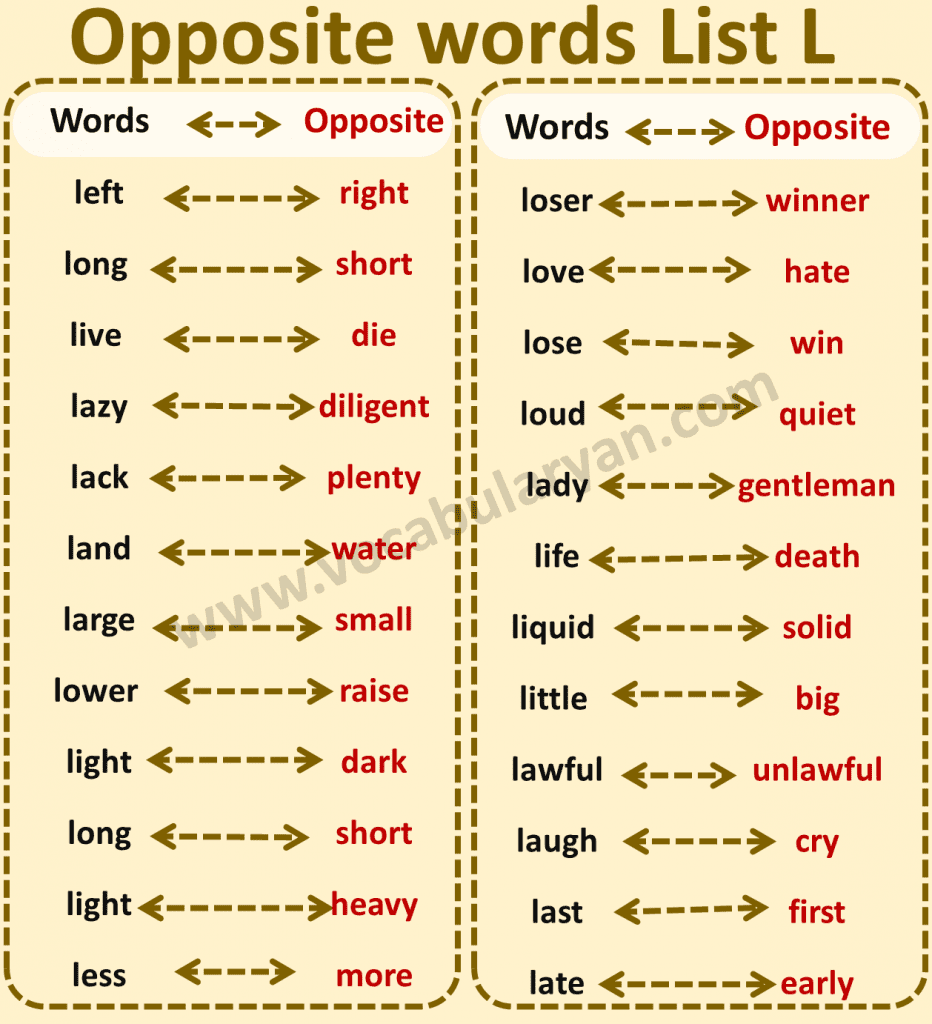
M – Opposite Words
M word opposites often show amounts or mood. For example, “more” means greater, and “less” means smaller. These are useful in math and daily conversation.
- Midnight – Noon
- Modern – Ancient
- Major – Minor
- Male – Female
- Maximum – Minimum
- Mean – Generous
- Miser – Spendthrift
- Moon – Sun
- More – Less
- Marry – Divorce
- Mirth – Depression
- Man – Woman
- Mature – Immature
- Morning – Evening
- Miss – Catch
- Moderate – Extreme
- Much – Little
- Monarchy – Republic
- Mountain – Valley
- Most – Least
- Master – Servant
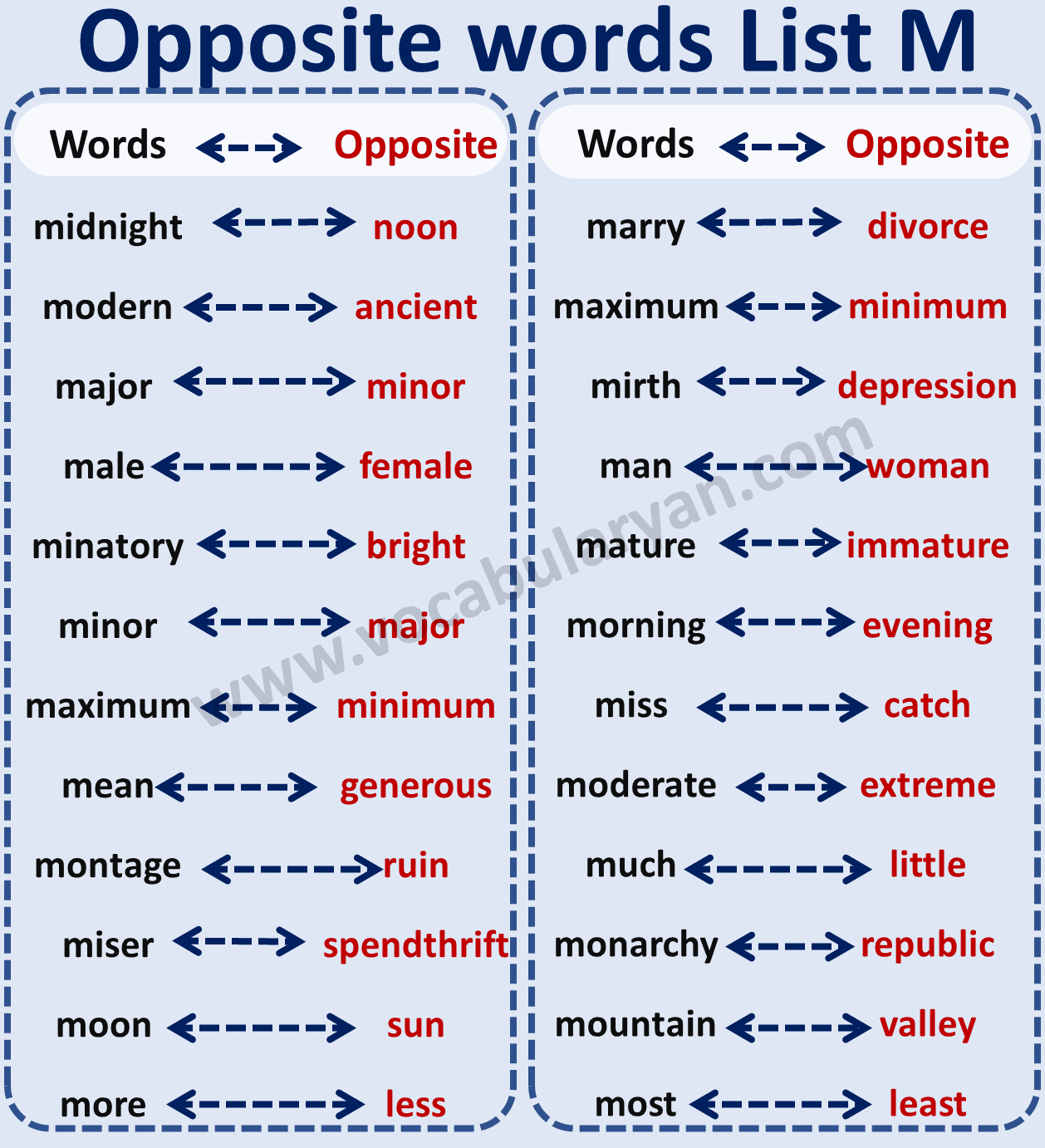
N – Opposite Words
N words can explain ideas or facts. For example, “noisy” means loud, while “quiet” means soft. These help talk about sound and surroundings.
- Near – Far
- Narrow – Wide
- Negative – Positive
- New – Old
- No – Yes
- Noble – Common
- Normal – Abnormal
- Natural – Artificial
- Night – Day
- Neat – Messy
- Never – Always
- Naked – Dressed
- Nice – Rude
- Nurture – Neglect
- Narrow – Broad
- Noticeable – Invisible
- Nurturing – Abandoning
- Necessary – Unnecessary
- Naughty – Well-behaved
- Nervous – Calm
- Nothing – Something
- Native – Foreign
- Noxious – Beneficial
- Newborn – Elderly
- Noble – Ignoble
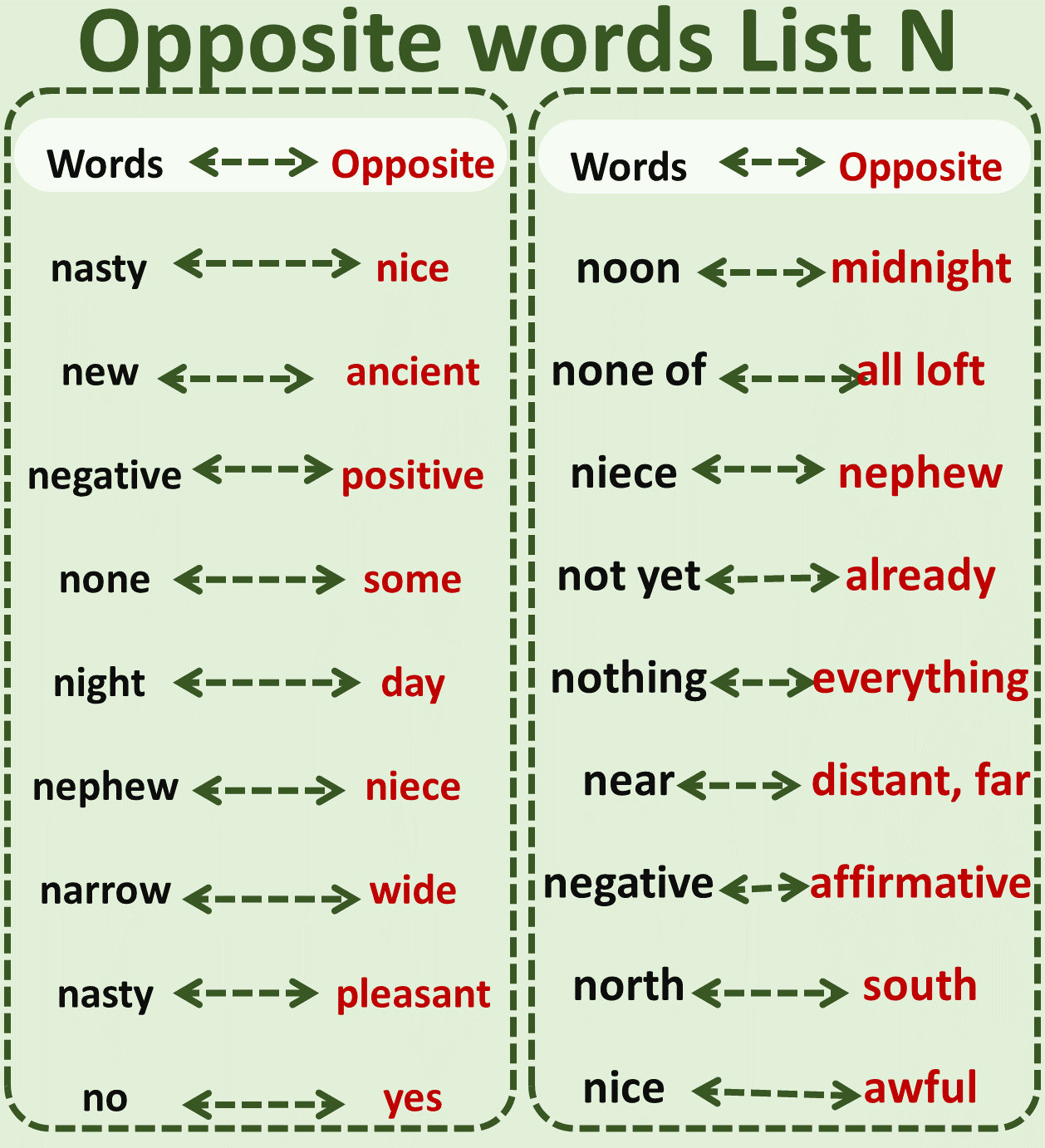
P – Opposite Words
P words show feelings or direction. For example, “push” means to move away, and “pull” means to bring closer. These are helpful when giving physical commands.
- Positive – Negative
- Powerful – Weak
- Push – Pull
- Plentiful – Scarce
- Proud – Humble
- Poor – Rich
- Public – Private
- Permanent – Temporary
- Pale – Dark
- Perfect – Imperfect
- Present – Absent
- Peace – War
- Pure – Impure
- Polite – Rude
- Practical – Impractical
- Pessimistic – Optimistic
- Proud – Ashamed
- Part – Whole
- Possible – Impossible
- Passive – Active
- Private – Public
- Punctual – Late
- Pleasure – Pain
- Pale – Flush
- Precious – Cheap
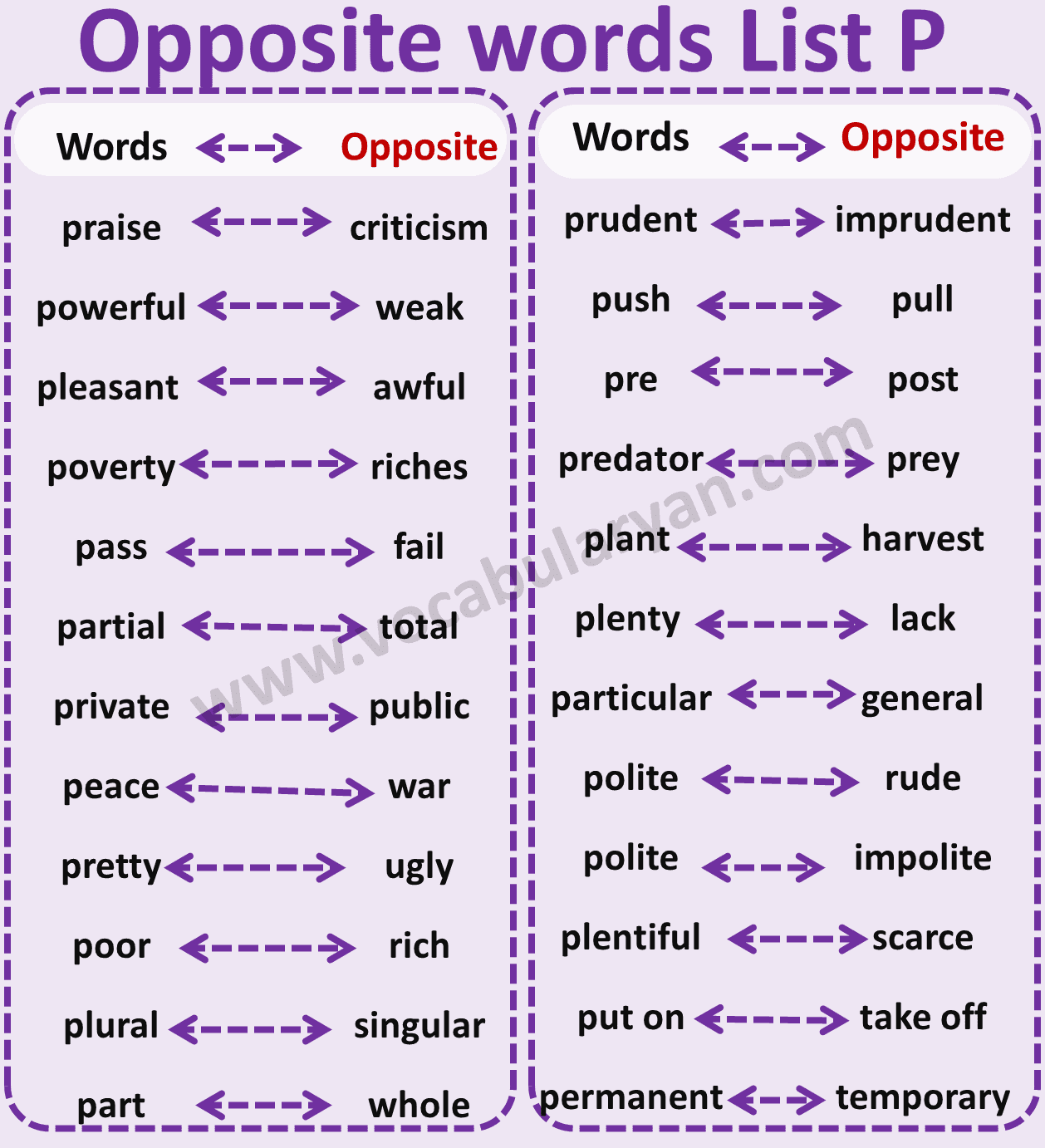
Q – Opposite Words
Q has limited pairs, but still helpful ones. For example, “quick” means fast, and “slow” means not quick. These help describe speed and time.
- Quarter – Whole
- Queen – King
- Quick – Slow
- Quagmire – Desert
- Queries – Answers
- Quite – Hardly
- Qualified – Unqualified
- Quadrant – Circle
- Quietly – Loudly
- Question – Answer
- Quiet – Noisy
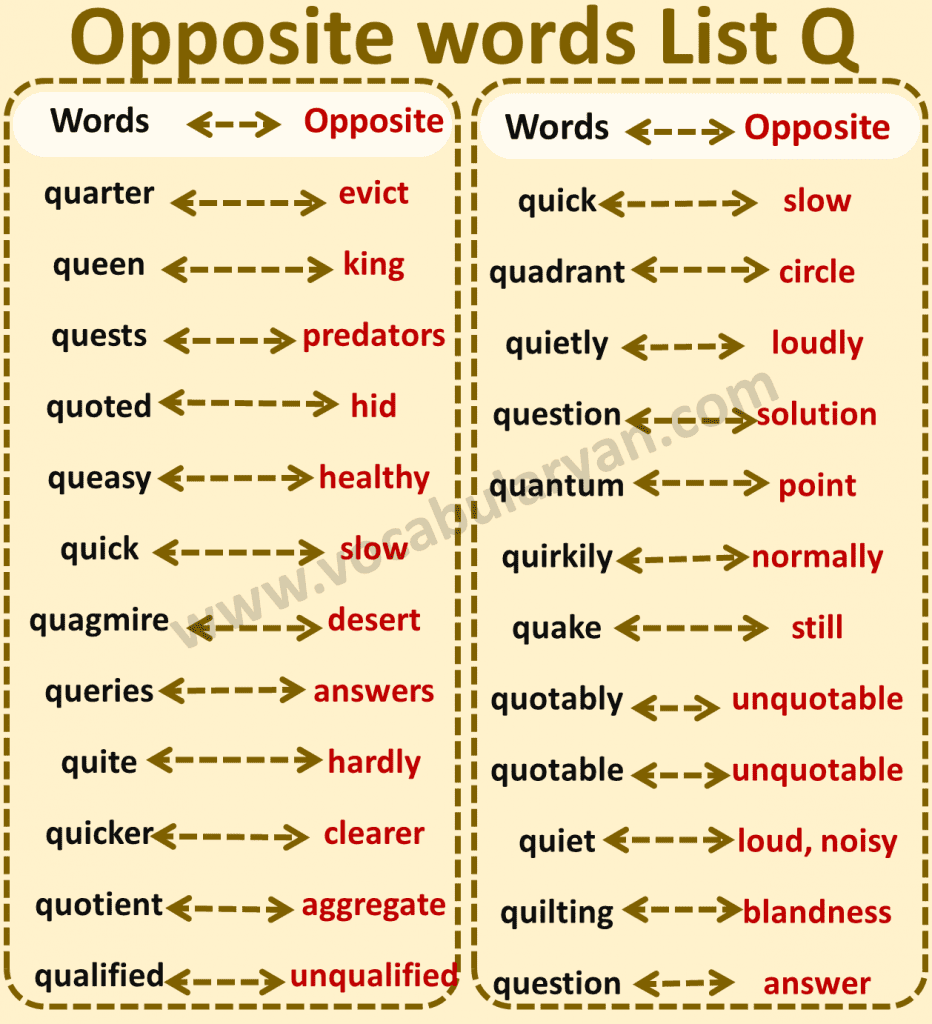
R – Opposite Words
R word opposites often talk about behavior or state. For example, “rise” means go up, and “fall” means go down. Useful for describing movement.
- Rapacious – Charitable
- Rich – Poor
- Right – Wrong
- Raze – Construct
- Rural – Urban
- Real – Fake
- Reply – Question
- Radiant – Dull
- Renege – Fulfill
- Rough – Smooth
- Rude – Polite
- Relevant – Irrelevant
- Rainy – Sunny
- Rear – Front
- Rakish – Unfashionable
- Rare – Common
- Rapid – Slow
- Regular – Irregular
- Roil – Pacify
- Retract – Extend
- Resound – Execrate
- Retrench – Augment
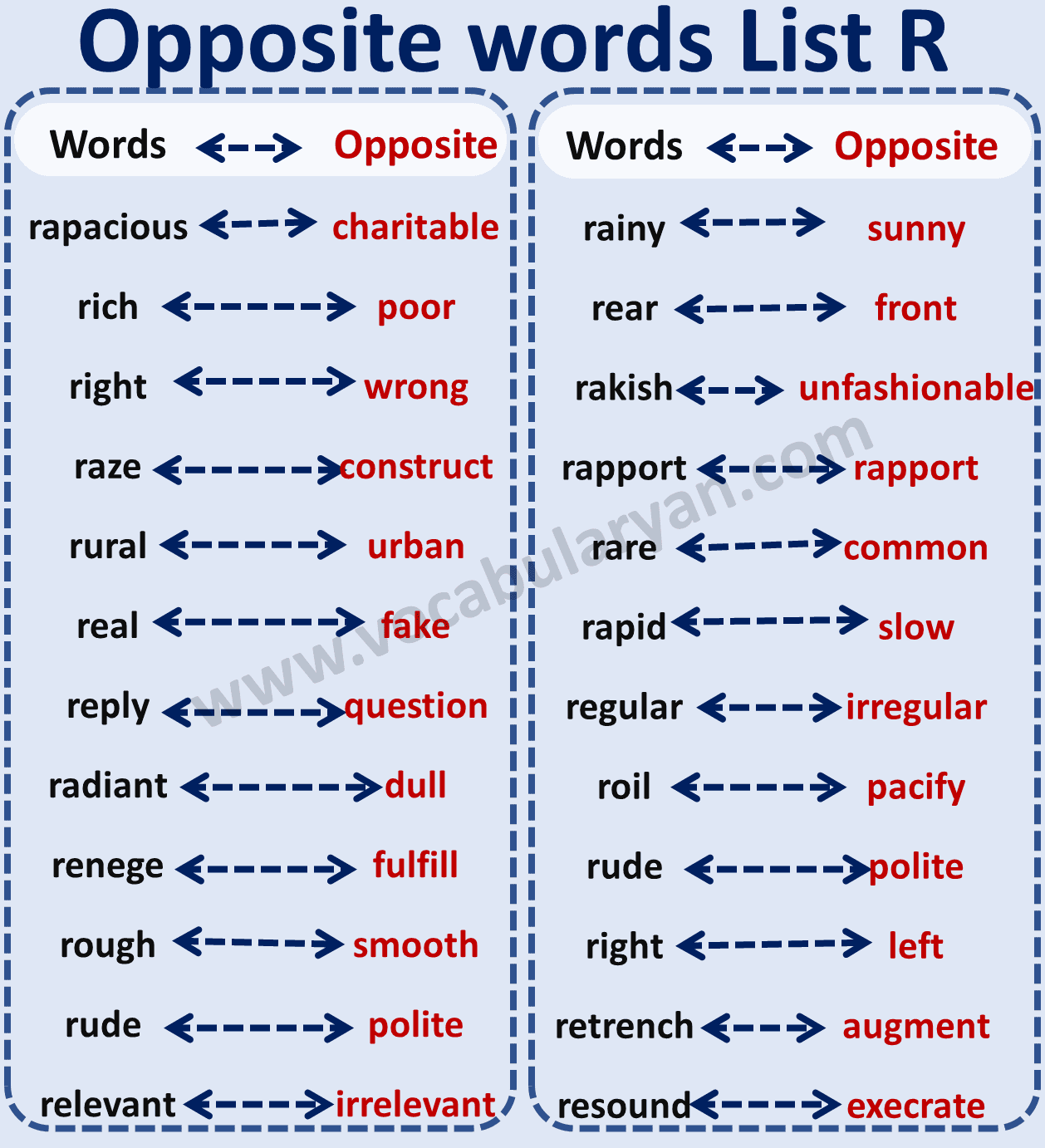
S – Opposite Words
S opposites are common in daily use. For example, “strong” means powerful, and “weak” means not strong. These help talk about people and objects.
- Summer – Winter
- Sun – Moon
- Safe – Dangerous
- Security – Danger
- Sweet – Bitter
- Synonym – Antonym
- Spring – Autumn
- Sometimes – Often
- Start – Finish
- Sour – Sweet
- South – North
- Sunny – Cloudy
- Supporter – Opponent
- Sugar – Salt
- Strong – Weak
- Stupid – Clever
- Sadness – Happiness
- Soul – Body
- Suburb – Center
- Strange – Normal
- Success – Failure
- Student – Teacher
- Strict – Gentle
- Solid – Liquid
- Special – General
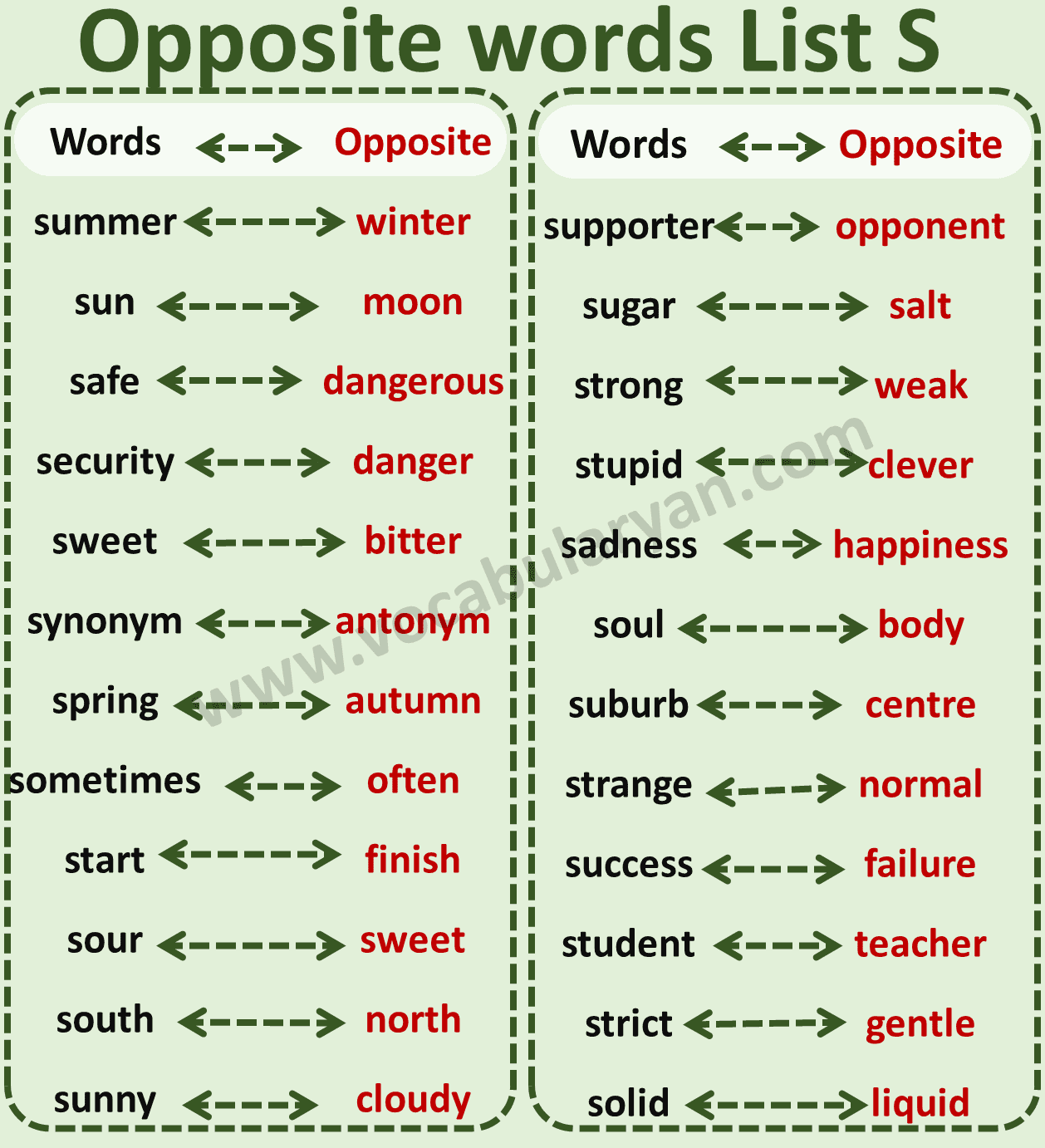
T – Opposite Words
T words help describe time or truth. For example, “tall” means high, and “short” means not tall. These are useful for comparing people or things.
- Teacher – Student
- Then – Now
- Teach – Learn
- Terrible – Lovely
- Tame – Wild
- Tall – Short
- Total – Partial
- Tight – Loose
- Tiny – Giant
- Thirsty – Full
- Tolerant – Intolerant
- Thick – Thin
- Together – Apart
- True – False
- Tragedy – Comedy
- Thrive – Fail
- Town – Village
- Tie – Untie
- Transparent – Opaque
- Tomorrow – Yesterday
- Tough – Easy
- Top – Bottom
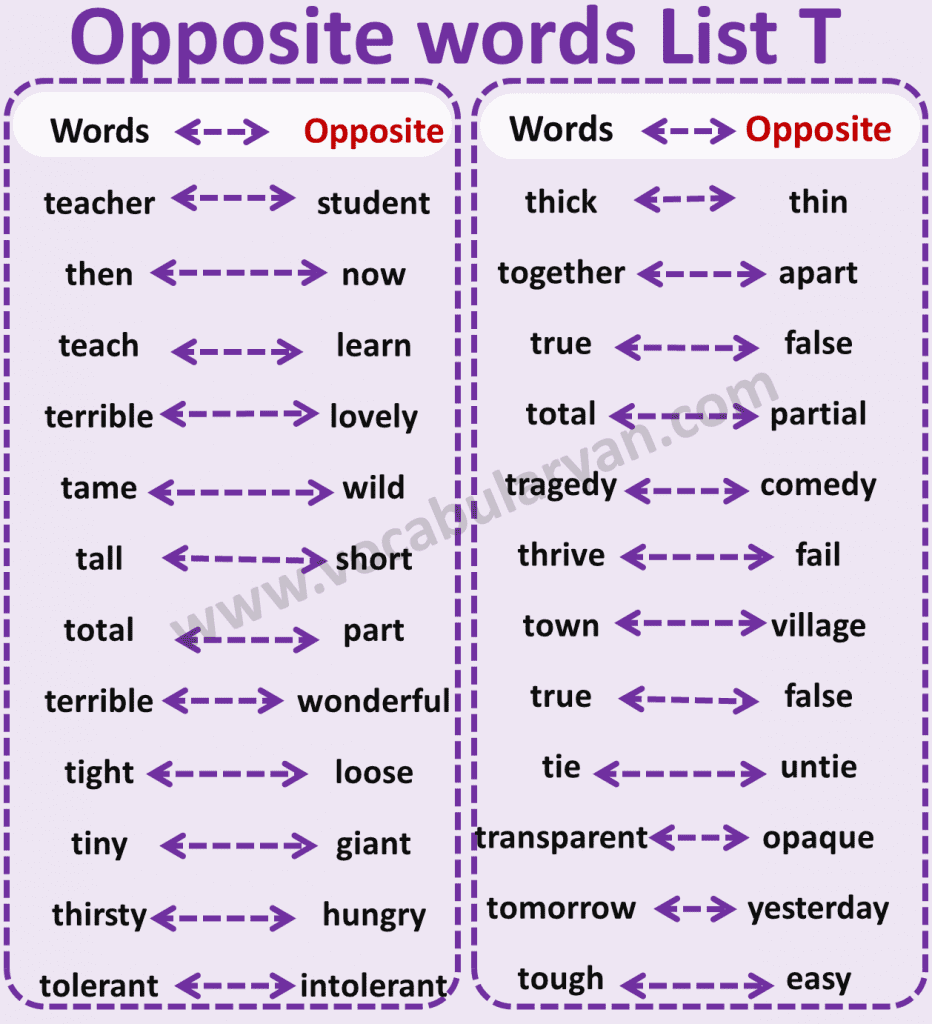
U – Opposite Words
U words often describe appearance or direction. For example, “up” means above, and “down” means below. These are used in giving steps or location.
- Unity – Division
- Untried – Experienced
- Up – Down
- Union – Separation
- Unease – Peace
- Untouchable – Reachable
- Understand – Misunderstand
- Urban – Rural
- Unqualified – Qualified
- Ugly – Beautiful
- Us – Them
- Unknown – Known
- Unique – Common
- Upbringing – Adulthood
- Useful – Useless
- Uncanny – Ordinary
- Ugliness – Beauty
- Under – Over
- Unsafe – Safe
- Untrue – Loyal
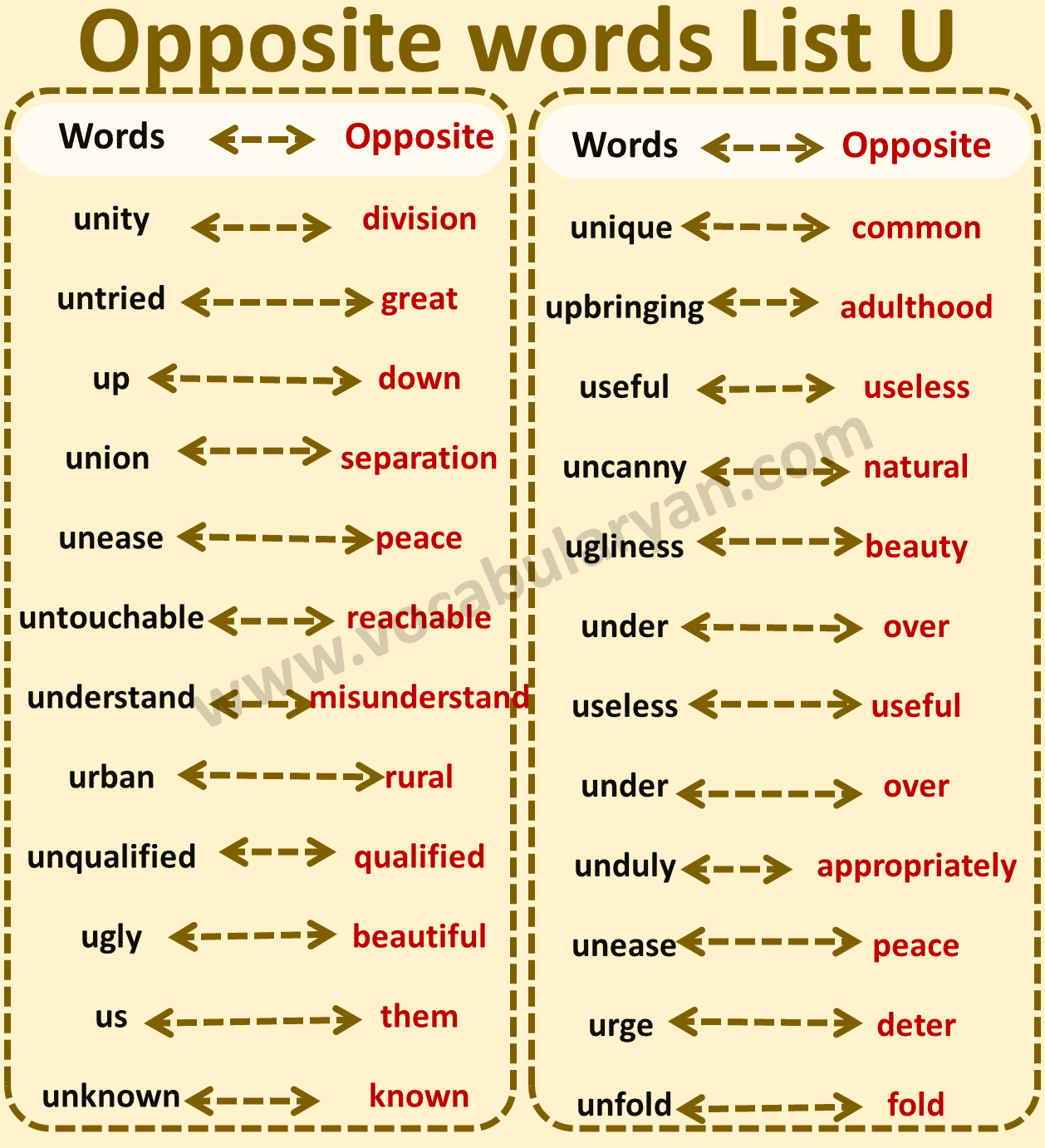
V – Opposite Words
V opposites may show value or movement. For example, “victory” means win, while “defeat” means loss. Great for talking about sports or success.
- Victory – Defeat
- Valid – Invalid
- Vast – Small
- Vocal – Quiet
- Vivid – Dull
- Vulnerable – Protected
- Vain – Modest
- Visible – Invisible
- Vertical – Horizontal
- Vast – Limited
- Vigorous – Weak
- Valuable – Worthless
- Vocal – Mute
- Vile – Noble
- Vile – Pleasant
- Voluntary – Involuntary
- Vivid – Faded
- Vain – Humble
- Venerable – Disrespectable
- Vent – Seal
- Vast – Tiny
- Virtuous – Wicked
- Vengeful – Forgiving
- Vulgar – Polite
- Vibrant – Dull
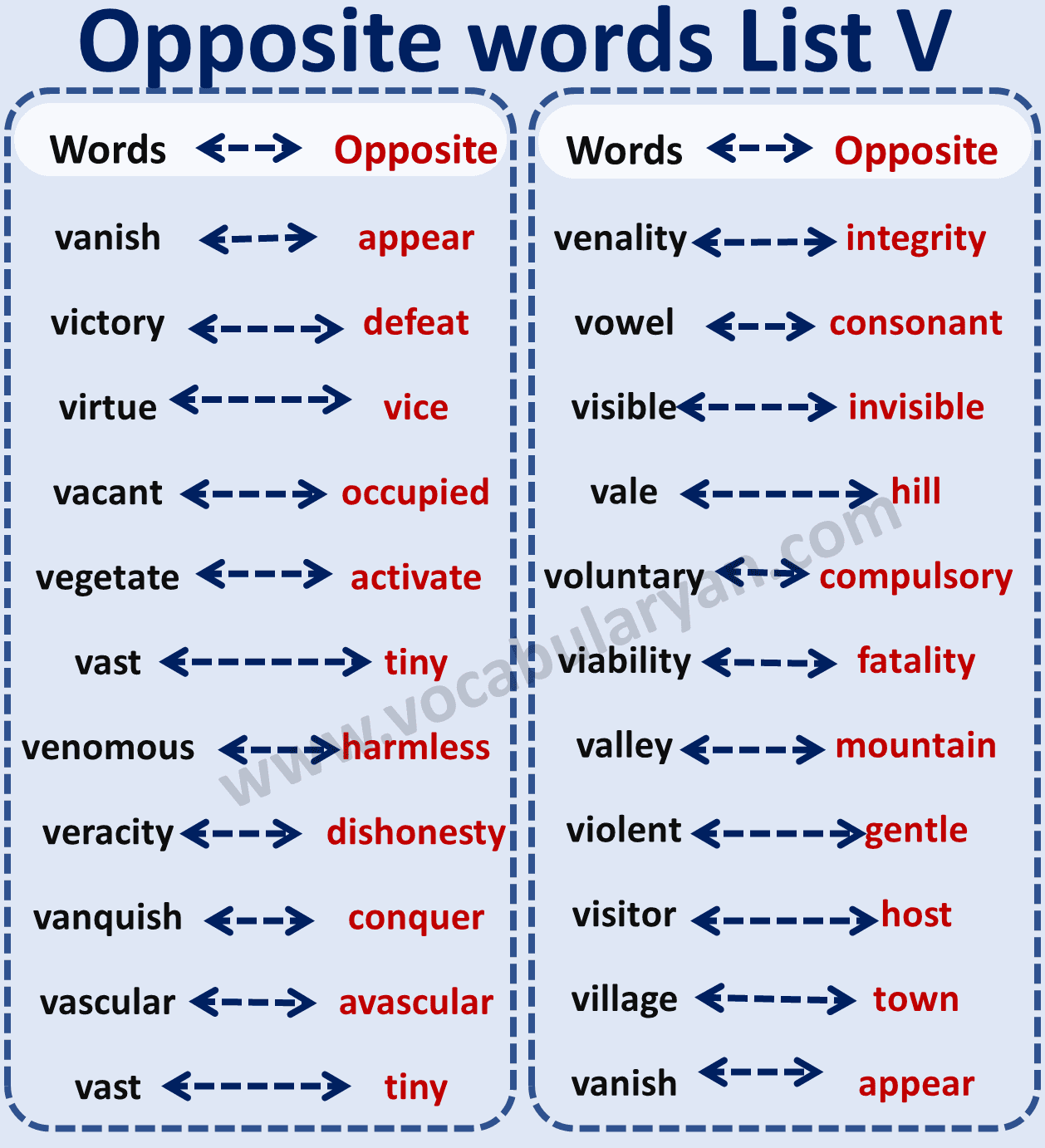
W – Opposite Words
W words help with describing situations. For example, “wet” means covered with water, and “dry” means not wet. These are useful in weather and conditions.
- Win – Lose
- Wide – Narrow
- Warm – Cold
- Weak – Strong
- Wet – Dry
- Wild – Tame
- Wrong – Right
- Wise – Foolish
- Wholesome – Unhealthy
- Welcome – Reject
- Willing – Unwilling
- Wealthy – Poor
- Wonderful – Terrible
- Wide – Tight
- Wage – Spend
- Worry – Relax
- Wander – Stay
- Weakness – Strength
- With – Without
- Wide – Thin
- Win – Fail
- Worn – New
- Whisper – Shout
- Work – Rest
- Wide – Small
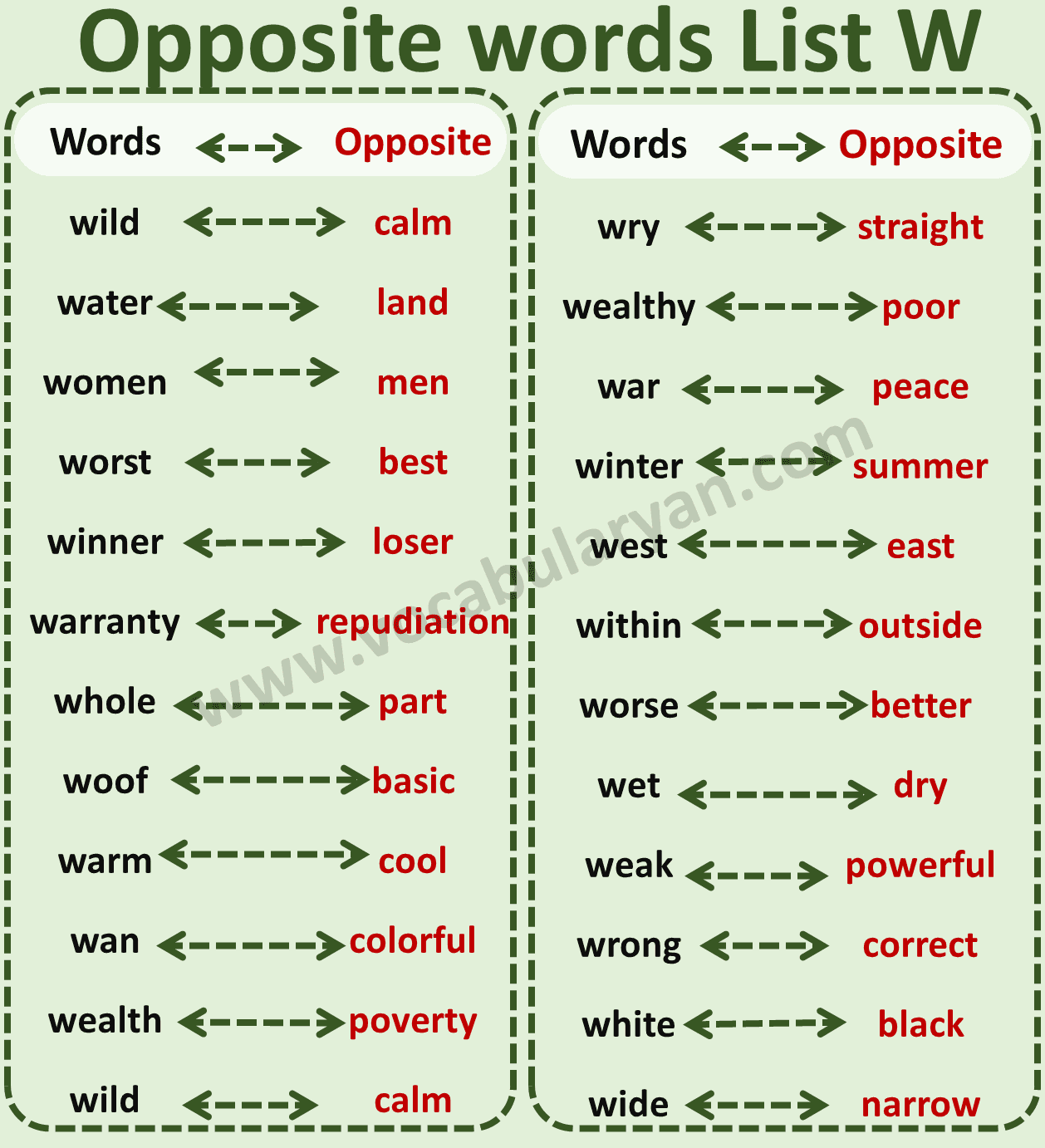
Y – Opposite Words
Y words are not many, but still important. For example, “young” means not old, while “old” means aged. These are common when talking about people.
- Young – Old
- Yes – No
- Yell – Whisper
- Yield – Resist
- Yesterday – Today
- Yummy – Disgusting
- Yearly – Monthly
- Yours – Mine
- Yen – Disinterest
- Yoke – Freedom
- Yellow – Green
- Yawn – Wake
- Yin – Yang
- Yoke – Release
- Yucky – Tasty
- Youthful – Aged
- Yanked – Gently pulled
- Yonder – Here
- Yes – No
- Yell – Quiet
- Yarn – Thread
- Yoke – Liberation
- Yin – Yang
- Yucky – Delicious
- Yawn – Excited
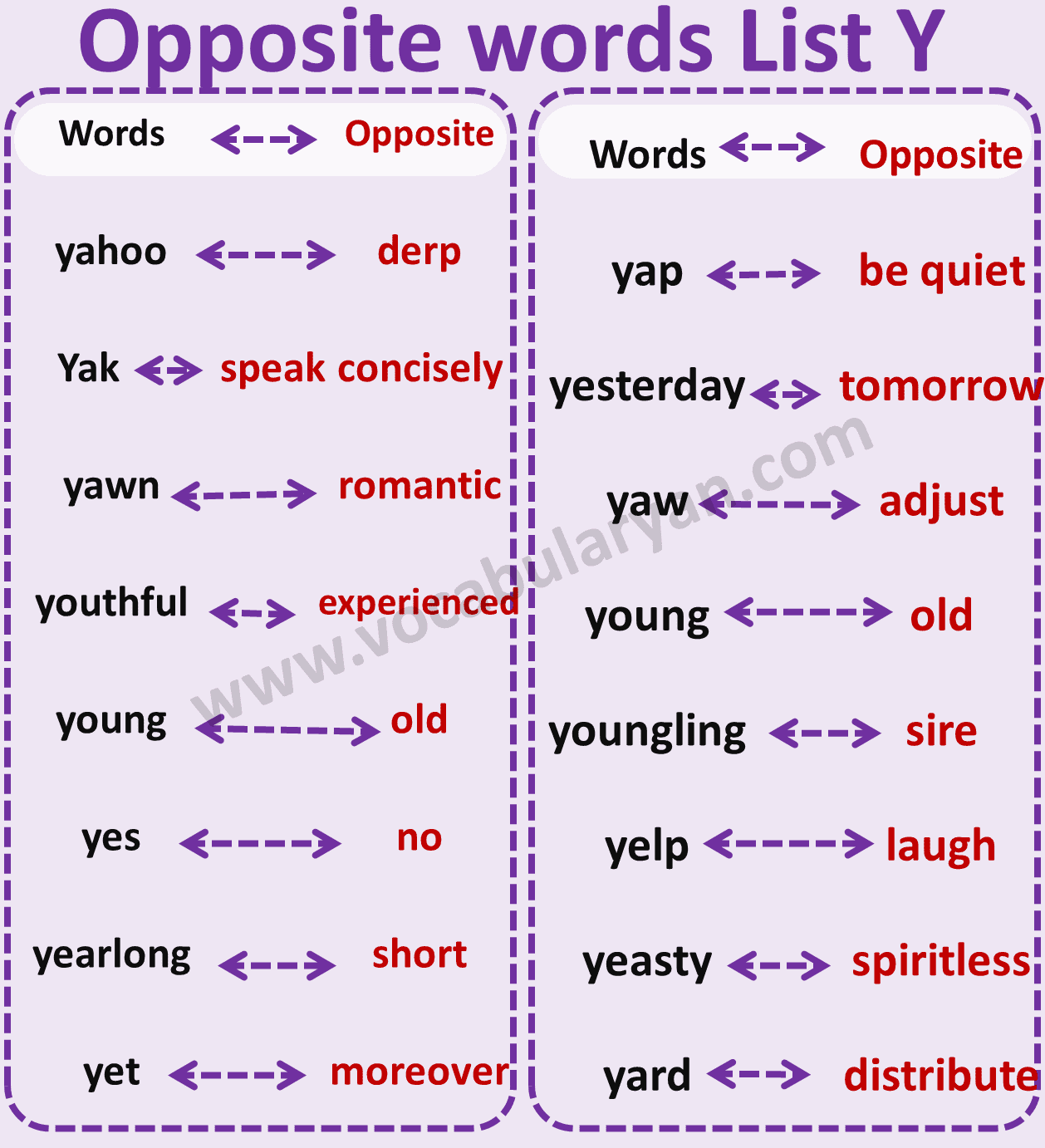
Z – Opposite Words
Z words are rare, but opposites can be formed. For example, “zenith” means the highest point, and “nadir” means the lowest. These help in geography or writing.
- Zip – Slow
- Zero Point – All
- Zigzag – Straight
- Zip – Unzip
- Zebra Crossing – Bike Lane
- Zany – Clever
- Zero In – Digress
- Zombies – Angels
- Zephyr – Windstorm
- Zones – Wholes
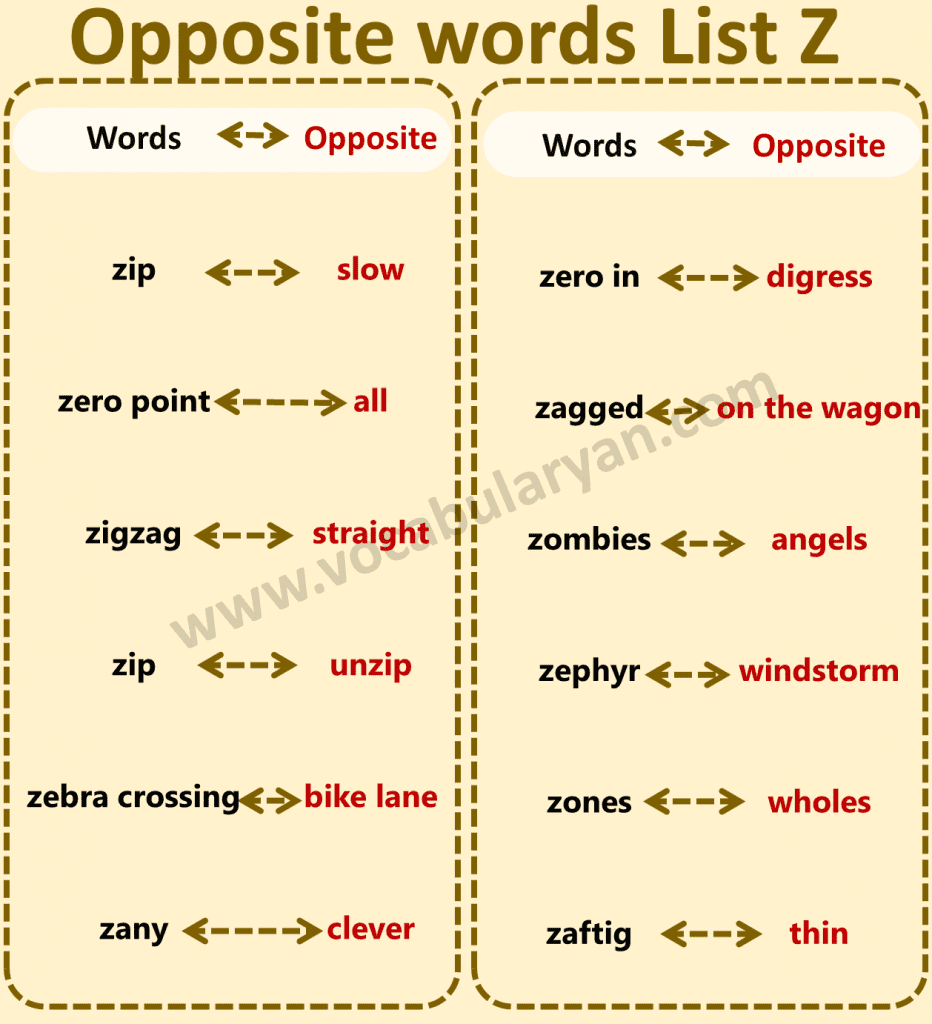
You May Also Like
